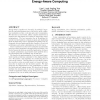133 search results - page 26 / 27 » Benchmarking Implementations of Lazy Functional Languages |
CCS
2010
ACM
13 years 6 months ago
2010
ACM
Secure two-party computation allows two untrusting parties to jointly compute an arbitrary function on their respective private inputs while revealing no information beyond the ou...
LCTRTS
2004
Springer
13 years 11 months ago
2004
Springer
Energy-aware compilers are becoming increasingly important for embedded systems due to the need to meet conflicting constraints on time, code size and power consumption. We intro...
PLDI
2003
ACM
13 years 11 months ago
2003
ACM
Speculative execution, such as control speculation and data speculation, is an effective way to improve program performance. Using edge/path profile information or simple heuristi...
ASPLOS
1987
ACM
13 years 9 months ago
1987
ACM
One potentialdisadvantage of a machine with a reduced instruction. set is that object programs may be substantially larger than those for a machine with a richer, more complex ins...
POPL
2012
ACM
12 years 1 months ago
2012
ACM
Interpolation is an important technique in verification and static analysis of programs. In particular, interpolants extracted from proofs of various properties are used in invar...

